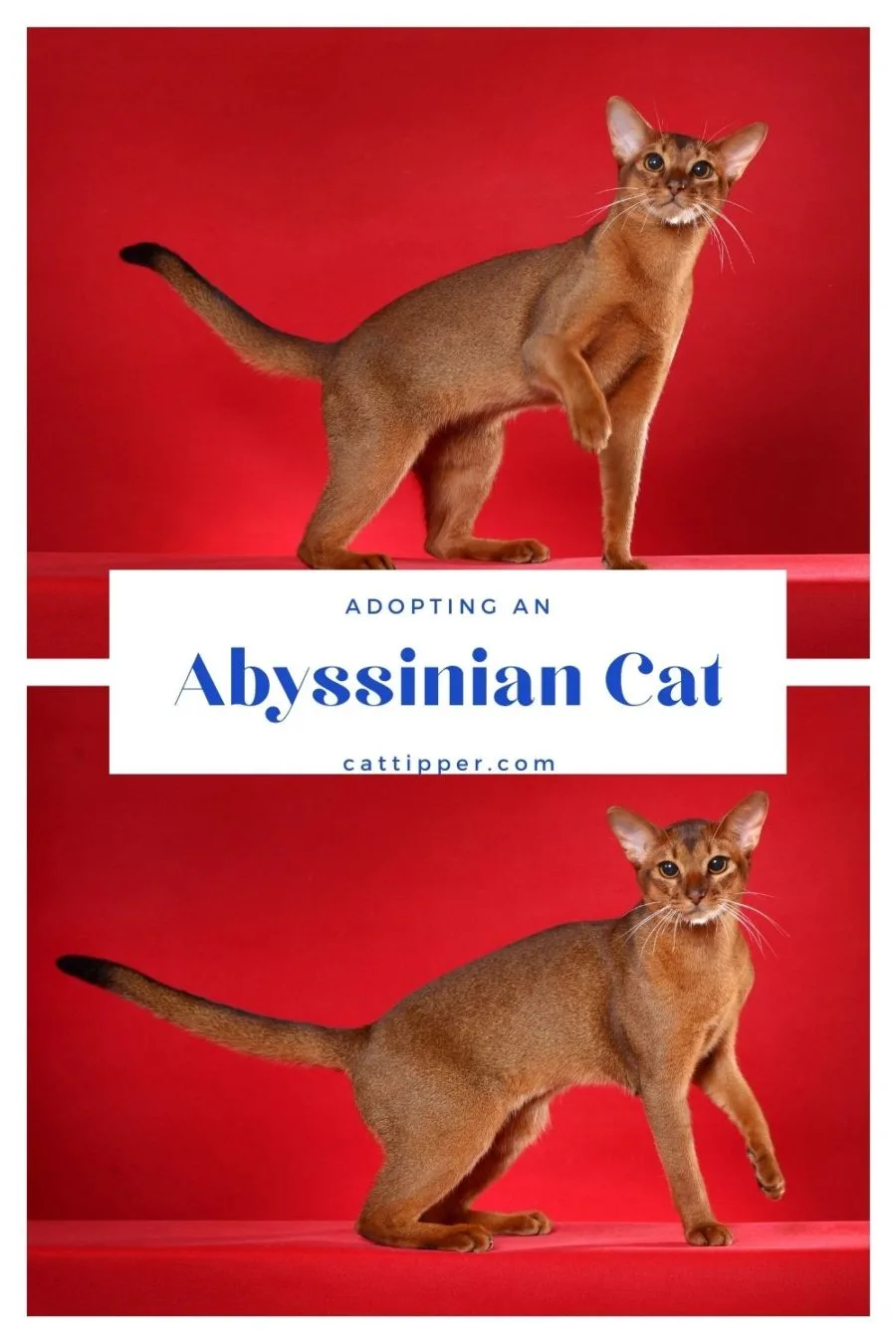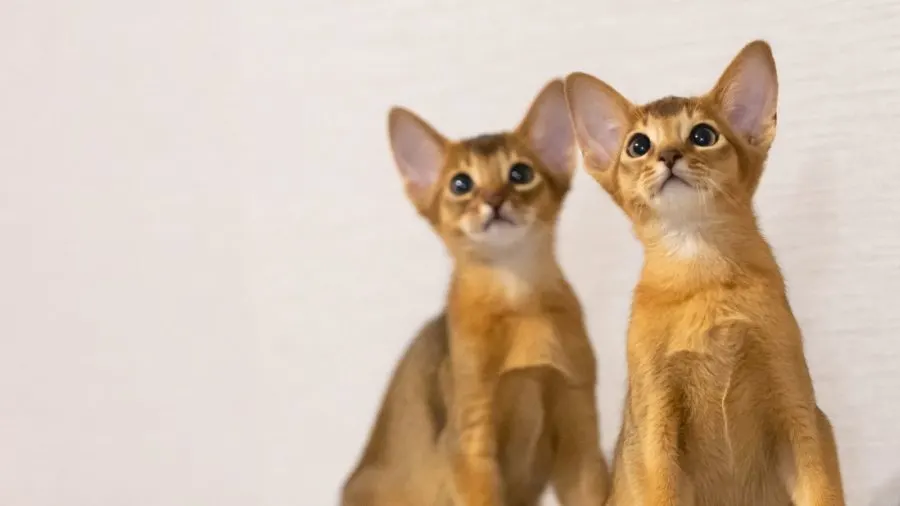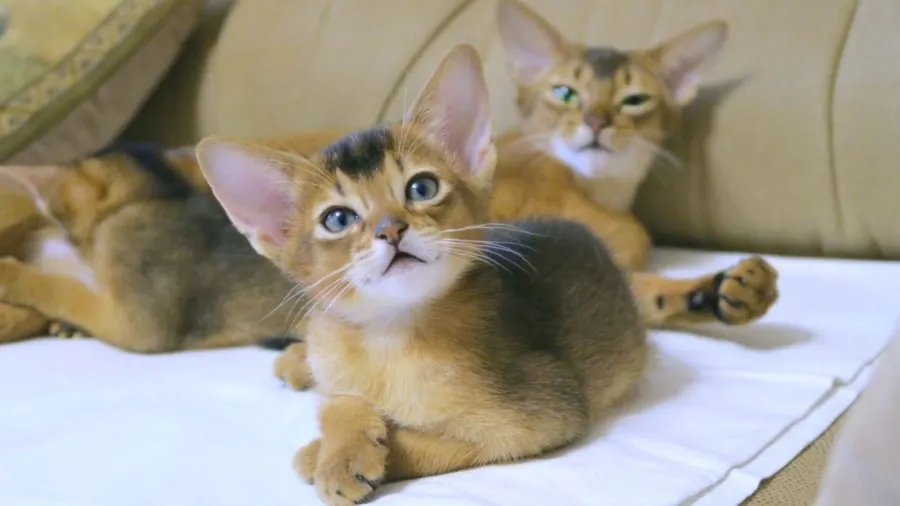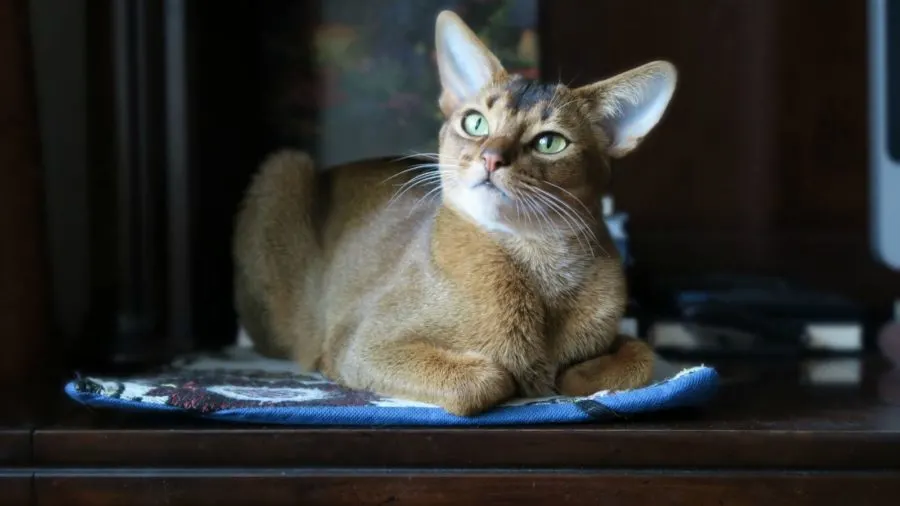Are you looking for a stunning cat with the allure of an exotic cat and the temperament of a domestic cat? One who loves to play and is described as doglike by many cat fanciers? You just might be looking for an Abyssinian.
Named for the land that is now Ethiopia, the Abyssinian (or Aby, as they’re known by their fans) is known for its distinctive ticked or agouti coat, a tabby variation that causes the root of the hair to be light colored, followed by numerous bands and a darker tip.

Abyssinian Cat Personality
But, for all their beauty, it’s the personality of the Abyssinian that send many cat lovers to rescues in search of a new family member.
Cat lover Ellen Wexler has shared her home with many Abyssinians, falling in love with the breed decades ago.
“I had no idea what an Abyssinian was. I went to a breeder’s home and was met by the most stunning animals that I had ever seen. They were on my lap – little cougars. They were on my lap giving head-butts and kisses. I was enchanted and brought home a few month-old female that I named Lacy. I had her for over 17 years.”
Wexler describes the Abyssinian as “athletic, sleek, affectionate, and intelligent. They are really very dog-like but you don’t have to take them out to potty when it is -10 degrees. Many of them like to fetch. They love the water. I have one who gets in the tub with (or without) me. They are so beautiful with their ticked fur, big ears, almond eyes, and lithe bodies. They are social butterflies.”
In fact, Wexler cautions potential pet parents who don’t have enough time to spend with their Abyssinian, noting that this might not be the best breed for cat households with limited time.
“Abys LOVE their humans so if you are rarely home I do not recommend them (nor any other pet, if truth be told). I do recommend two cats. They don’t have to both be Abys. Two is so much fun and they will have one another to groom and play with when you are not home.”
With their love of climbing and tree dwelling personalities, Wexler also emphasizes the importance of keeping an Abyssinian in the house.
“They do like to be up high, so if you want a pet who remains on the floor, forget it! They are great jumpers and should be allowed to do so. A tall cat tree with a sisal post for scratching are important.”
Through the years, Wexler has fostered many rescued Abyssinians and notes that there are many of these adoptable Abyssinian cats searching for forever home. The longtime cat lover also points out that many great adult and senior Abyssinians are also available for adoption. (You can filter Petfinder listings to show adoptable Abyssinians!)
This loving and intelligent breed (so smart, in fact, that one episode of The Simpsons jokingly featured Abyssinians with the ability to change TV channels) makes a lifelong impression on their families.
Many, like Wexler, find themselves sharing their lives with this affectionate breed generation after generation. Says Wexler, “With any luck I will never be without an Aby. So far, so good.”
History of Abyssinian Cats

The first Abyssinian cat known to have been brought out of its natural environment to be a domestic pet in the West was Zula, a female kitten taken from Alexandria to the UK in the 1860s by the British soldier Captain Barrett Leonard. He crossed Zula with a tabby.
By 1871 the breed was recognized and exhibited at the Crystal Palace in London.
Although it is possible that other soldiers may also have brought home cats during the Abyssinian War, it is generally believed that all Abyssinians in Europe, North America and Australia are descended from Zula. The gene pool has been enriched a little in the USA with the import of Abyssinians from North Africa, where they can still be found living wild in some regions.
The ‘Aby’, as this breed is popularly known, is now one of the most popular shorthair pedigree breeds of cat in the USA.
Appearance

The Abyssinian is a medium sized, well shaped shorthaired cat with a princely appearance and a distinctively ticked coat. What this means is that each hair is striped with two different colors alternating in bands from root to tip. The effect is to give the coat a noticeable sparkle, especially when stroked.
To qualify for pedigree status the cat’s body must have no tabby markings, although there are usually some on the tail and paws.
Abys have large ears and big almond-shaped eyes. The eyes are green, gold or hazel with a fine dark line around the iris.
Abyssinian Cat Colors

The Abyssinian coat is usually a warm tawny color but there are blue and silver variants. The recognized color classifications vary from country to country, but in the US they include:
- red
- ruddy
- fawn
- cream
- blue
- lilac
Temperament

Abys are very active, muscular cats whose closeness to their wild ancestors can easily been seen in their temperament and behavior. They are friendly and affectionate and make great pets but usually spend more time playing and exploring than curling up on somebody’s knees.
Often, they will adopt one person in the family to be their special favorite.
They like a lot of activity, variety and attention and can become depressed if left shut in a small apartment all day while owners are working. They often enjoy getting up in high places and will explore the top of tall furniture and climb onto your shoulders!
Owners describe Abyssinian cats as intelligent and loyal ‘people cats’. Many owners would never consider having any other breed of cat.
Portions of this post appeared as a freelance article we authored in 2014.
Photos: Canva Pro
